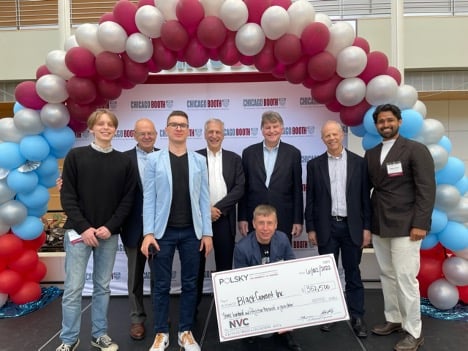Blackcurrant: An Online Marketplace for Alternative Fuel

Blackcurrant is one of three startups selected for the first cohort of Transform.
A startup in the inaugural cohort of Transform, a data science and AI accelerator, Blackcurrant is looking to accelerate its aggressive growth strategy and capitalize on opportunities for federal funding.
It was on a trip in December 2021 when the idea for Blackcurrant, an online business-to-business marketplace for the buying and selling of hydrogen, began to crystallize for neighbors and future cofounders Akshay Thakur and Yaroslav Kharkov.
“We were on the beach with a notebook sketching out the challenges we wanted to solve,” said Thakur, a current University of Chicago Booth School of Business student and the company’s CEO. “We identified a lot of challenges and a sea of opportunities, and we started narrowing it down to the ones we thought were the most important and relevant and most likely to work today. It was then that we decided that solving the access to hydrogen is where we wanted to be.”
With a background in electrical engineering, Thakur cut his teeth in the hydrogen space at Amazon, where he led the company’s adoption of the alternative fuel source. Kharkov, who serves as Blackcurrant’s chief technology officer, has a PhD in quantum physics and currently works in quantum computing and machine learning at Amazon.
The pair zeroed in on the buying and selling of hydrogen because the current process can be inefficient and cumbersome, Thakur said, providing a roadblock to greater adoption of this clean fuel. Buyers send out requests-for-proposals (RFPs) to suppliers, which they must review and select before negotiating a contract. This could take as much as seven months to complete.
With Blackcurrant, the process takes as little as two months. They achieve this by using advanced machine learning to provide market data about hydrogen products to consumers, as well as automating many of the manual processes involved in the transaction. The founders plan to further streamline their process with a goal of reducing transaction time to just one day.
“We are working toward a platform that provides automatic onboarding and payment processing within the platform itself,” said Kharkov. “These pieces will further streamline the process and get us to that one-day transaction.”
The platform also provides carbon intensity tracking on each trade. This gives businesses information on how the transaction affects their net-zero carbon goals as well as what credits they may be eligible for through the Inflation Reduction Act of 2022.
A Great Time for Hydrogen
Through this act, the U.S. government plans to pump about $8 billion into hydrogen fuel. It includes $7 billion earmarked for the Department of Energy’s Regional Clean Hydrogen Hubs program. The program will create six to 10 regional clean hydrogen hubs that connect producers, consumers, and local connective infrastructure to accelerate the use of hydrogen as a clean energy.
Thakur and Kharkov have embarked on an aggressive growth strategy for Blackcurrant, a part of two hubs vying for the federal funding, to capitalize on the opportunity the act provides.
“I thought we would have time to develop our business over two to three years as the market grew, but the actions by the government show that hydrogen is important now,” said Thakur. “And with only six to 10 hubs being funded, it really is winner take all. For us, that means we need to raise money, get resourced, and support the market quickly.”
The founders see Transform, a data science and AI accelerator at The Polsky Center in partnership with the UChicago Data Science Institute, as giving them a leg up in their pursuit of growth.
“We see the program as helping us identify which obstacles to growth we should address first,” said Thakur, “as well as providing us guidance on raising funds in the near term to get us to the next phase.”
“I would also add that we’re excited about the guidance it will provide us from a technical perspective,” said Kharkov. “Validating our technical decisions with experts will be very valuable.”
The company has already found success in its early growth efforts. In 2022, it placed second in The Polsky Center’s Edward L. Kaplan, ’71, New Venture Challenge (NVC). It also shared that year’s NVC Moonshot Award, which recognizes technology companies that offer innovative solutions to global challenges, with the third-place finisher.

“That win was huge for us,” said Thakur. “When you’re building a business, you’re too close to it and are always questioning it in your mind. Our success helped validate that the product we’re delivering can have an impact.”
As they look to the future, the founders have plans to steadily grow Blackcurrant into a hydrogen marketplace that will serve the globe. Once they’ve expanded across North America, they plan to enter Europe and then the Middle East. Eventually, they would like to reach Africa and India, Thakur’s home country and an inspiration for the company.
“I grew up in a neighborhood where electricity access was scarce, often not having light to do my schoolwork in the evenings,“ Thakur said. “I’d like Blackcurrant to make an impact back home and give countries access to renewable energy regardless of their level of development.”
Blackcurrant is one of three startups selected for the first cohort of the Transform accelerator.
>> Applications for Cohort 2 of Transform will be open April 17, 2023.